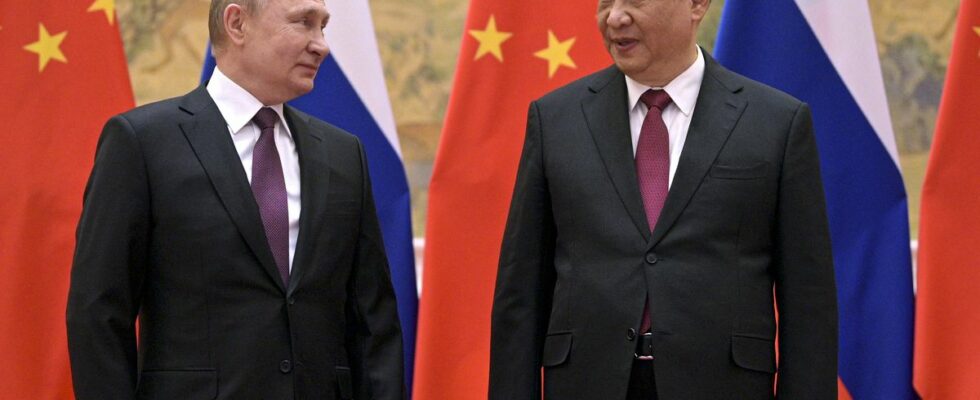Is Xi Jinping the only head of state who can whisper in Vladimir Putin’s ear, whom he calls his “best friend”? China has never condemned the invasion of Ukraine since last February 24, but neither does it seem to want to concretely engage in the conflict as a supplier of military aid to Russia.
While the head of Chinese diplomacy is welcomed this Wednesday by Emmanuel Macron, Paris wants to try once again to convince Beijing to intervene with Moscow to start talks with kyiv. Can China take on this role of mediator? How does she profit from the war? Can she take sides? Even if China has “the levers to” talk to Vladimir Putin, this idea remains “illusory” today, according to Marc Julienne, China specialist at the French Institute for International Relations (Ifri), contacted by 20 minutes.
Can China serve as mediator of the conflict as Emmanuel Macron seems to hope?
The war in Ukraine is on the menu of discussions this Wednesday between Wang Yi and the French president, before a possible visit by Emmanuel Macron to China. During his meeting with his Chinese counterpart at the G20 summit in Bali on November 15, the French head of state asked Xi Jinping to try to convince the Russian president to return to the “negotiating table”. But for Philippe Le Corre, researcher at the American Think Tank Asia Society Policy Institute“there is not the slightest hope that China is any mediator,” he told 20 minutes. “In addition to not having the capacity, she does not want to,” he insists.
Even if Beijing seems to be Russia’s best-placed partner to try to discuss with Vladimir Putin, “it is not in a position to manage such a complicated crisis between Europeans and Russia, especially since it does not is not directly involved”, he develops. For Marc Julienne, Beijing has “the levers to” bring weight to the debate, in particular channels of communication, means of economic pressure, but “it has never taken any initiative to promote a process of talks, unlike Turkey by example “. It is therefore a project deemed “illusory” despite their “limitless friendship”, he underlines. And if she played the game, “she would never do it for free, what would she ask for in return? asks Philippe Le Corre.
How is Beijing profiting from the war in Ukraine?
It is a strong but unfair friendship that binds Beijing and Moscow. If China manages to take advantage of Russia’s weakening on the international scene since 2014 and the annexation of Crimea, the invasion of Ukraine has only consolidated these ties and deepened the balance of power. “Before Crimea, Vladimir Putin was always reluctant to engage more with China, especially in energy, trade and space, but since then this cooperation has been strengthened”, explains to 20 minutes Marc Julienne. And since then, Beijing has obtained contracts at a discount for raw materials which make it possible to meet its “colossal needs”, particularly in terms of energy, adds the China specialist at Ifri. Economically, China is therefore largely found there, with bilateral trade between the two Asian powers which jumped in 2022. In March 2022, only one month after Russia’s declaration of war on Ukraine, exports from china have jumped 41.5% to Russia over a year.
THE status quo suits him. Especially since it is also taking advantage of this isolation from Moscow to impose itself on the international scene. “By not taking sides on one side or the other, it can continue to interact with many countries”, and not necessarily Western democracies, notes Philippe Le Corre. But for the so-called autocratic countries, China is today a great power which manages to rally opponents to America in a kind of “friendly of authoritarian regimes”, illustrates Philippe Le Corre. Thus, Beijing scores points economically and diplomatically. Today, in short, it has replaced Russia, which is losing a great deal in this war.
Why won’t China take sides?
With all these advantages that it draws from the war, Beijing therefore has no interest in modifying its position. Taking sides with Ukraine as more support for Russia could harm it, hence its intention to maintain this facade of neutrality. It cannot reasonably get along with Moscow any further, at the risk of being targeted by Western sanctions. “If Chinese companies start to trade with Russian companies under sanctions, Beijing would violate the sanctions as it tries to manage its relations with the West”, analyzes Philippe Le Corre.
On the other side, it cannot turn its back on Russia. “Having Russia among its allies is a great asset”, recalls Philippe Le Corre. And even if it does not recognize the territories annexed by Russia, supporting Ukraine would not be in line with its ideological position. “Beijing and Moscow are in a rivalry of the political model with the Western democracies, marked by an ideological fracture”, develops Marc Julienne. However, Ukraine is on the side of the European Union, NATO, the West. “China would have a lot to lose by becoming more involved and not much to gain,” he sums up. Especially since Beijing has other internal concerns, such as the crisis caused by Covid-19 or the worrying economic slowdown.

